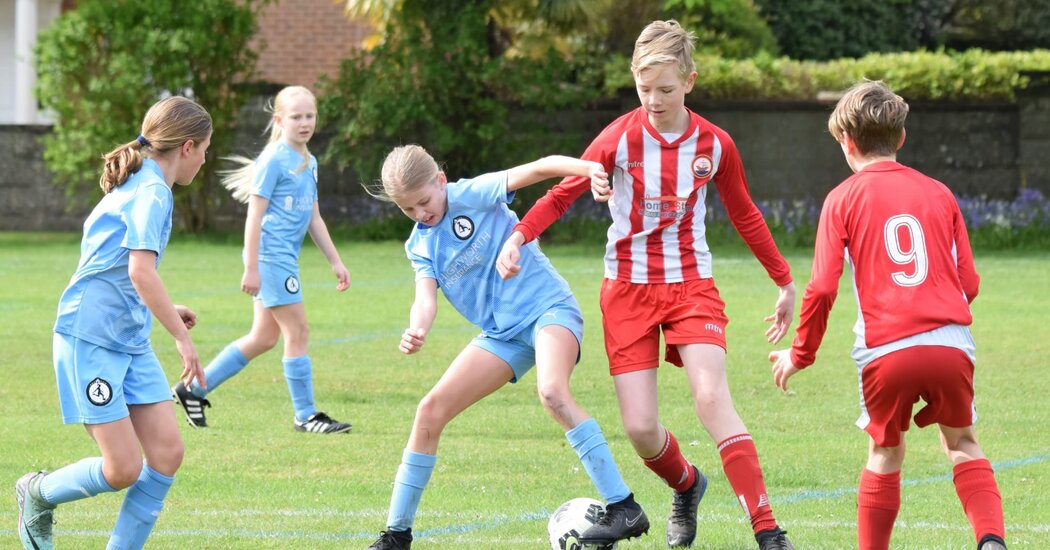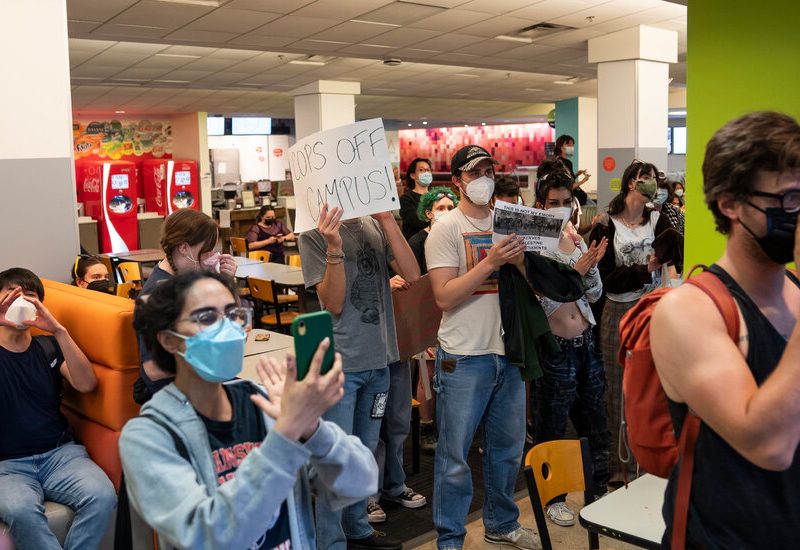With about four games left in the season, it became mathematically clear to the players and coaches of the Queens Park Ladies, an under-12 girls’ soccer team in Bournemouth, England, that they would win their league.
But rather than resting on their laurels and enjoying their guaranteed victory, they decided to take it a step further: What if they not only won their league, but also did so without losing a match?
If that wasn’t enough, they would be pulling it off as the only girls’ team in a boys’ league.
Reader, they did it. The Queens Park Ladies did not lose any of their 22 matches, earning them the elusive nickname “Invincibles,” one that conjures the memory of Arsenal’s undefeated 2003-04 Premier League season under Arsène Wenger.
“I just thought it was incredible that we’ve gone so far to beat some boys that are probably more physical than us,” Millie Ray, 11, a midfielder, said. “We actually came back and destroyed them.”
In interviews, the players praised one another and emphasized that they were also close friends, which helped their game.
“I feel really proud of my team and happy for us,” said Olivia Green, 12, the team’s captain. “I didn’t expect it, but I did think we could do it.”
Skylar Henshall-Dicks, 11, said, “I knew we were a good team.” But looking back on the season, she said, she was even more in awe. “Now that we have done it, it seems even more crazy,” she said.
The Queens Park Ladies gave up just 11 goals in 22 games — “a brilliant stat,” according to Toby Green, the team’s manager, and Olivia’s father.
Much of that is thanks to the goalkeeper, Mariah Silva, 12.
“When they needed me, I did my work,” Mariah said. “Sometimes there’s a lot of pressure,” she said, especially during penalty kicks.
Mariah joined the team three years ago, when she moved to England from Brazil, where she was used to playing against boys. She has big ambitions for the future: “My dream is to become a pro footballer,” Mariah said.
Girls vs. Boys
As their memorable 2023-24 season began, it took a little while for the Queens Park Ladies to be taken seriously by boys on opposing teams.
“Sometimes, especially at the beginning of the season when we hadn’t played them all yet, they were sniggering,” said Edith Wragg, 12, a defender. “They definitely underestimated us. But then we showed them that we were just as good as them.”
During their first game, their opponents seemed to assume that beating the team of girls would be easy, said Skylar, also a defender. But after a 6-0 victory by the Queens Park Ladies, their opponents were “quite taken aback,” she said.
Other players remembered similar moments. “Sometimes they do get a bit angry,” Olivia, the captain, said of opposing players. “I think they’re being a bit silly.”
If anything, those attitudes served as a motivating factor, said Chris Wragg, the team’s coach and Edith’s father.
“It’s a great equalizing environment, the football pitch,” Mr. Wragg said. “The only barriers really are the ones off the pitch.”
‘These Girls Are Serious’
Women’s soccer is a fast-growing sport. In England, much of the excitement around the sport can be attributed to the national women’s team, the Lionesses. They won the European Championship in 2022 — an accomplishment that still eludes their male counterparts — and reached the final of the Women’s World Cup the following year.
While the Lionesses serve as role models to the 11- and 12-year-old Queens Park Ladies, the girls said they hoped to be an inspiring force themselves.
“We’ve all just been thinking about how great it is to hopefully have other girls see it and inspire them to play football,” Edith said.
In Bournemouth, on England’s south coast, interest in girls’ soccer has increased in recent years, Mr. Green said. When the club, which fields teams in several age groups, started about six years ago, there weren’t as many girls interested in joining the team, he said. There was no girls’ league available at the time, so the Queens Park Ladies played in the boys’ league then, too, but with very different results.
“Those first few seasons, they won one game in two years, and they drew a couple,” Mr. Green said. “It was very hard.”
The players spent the ensuing years training and playing against both boys and girls. Once his team reached the under-12 league, Mr. Green said he got in touch with the county’s football association, the Hampshire Football Association, and managed to get the girls admitted to the boys’ league — after overcoming some slight hesitance.
“The Hampshire F.A. said, ‘Let’s give it a go,’” Mr. Green said. By finishing first this year, the Queens Park Ladies earned a promotion to Division 2 for next season, where they will play 11 vs. 11 (instead of their current nine a side) and on a bigger pitch for the first time.
“These girls are serious,” Mr. Green said. “They want to play as high level as they can.”
Mr. Green said he planned to start a ladies’ team — which starts at age 16 — with the club and to keep getting promoted until hitting the big leagues. “That’s the master plan,” he said.
Mr. Wragg, the coach, first gained coaching experience more than 20 years ago during a summer in Long Island, N.Y., which turned out to be a formative experience. Back then, he said, girls’ soccer was not yet popular or common in Britain.
“It was seen as unusual,” Mr. Wragg, who has a Ph.D. in exercise physiology, said. “But when I came to the States back then, it was more of a girls’ sport than it was a boys’ sport.”
Mr. Green said that he hoped that the increasing popularity of the game for women also meant better conditions for the women’s game. “We know that there’s a gap between the men’s game and the women’s game,” he said. “That gap is only because the men’s game has been going longer.”
But, he said, “the standards of the female game are getting better and better every year.”



